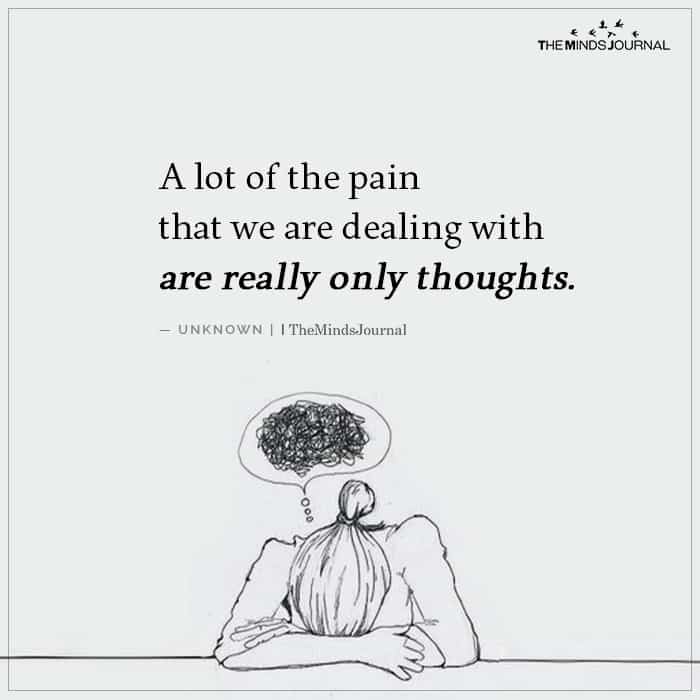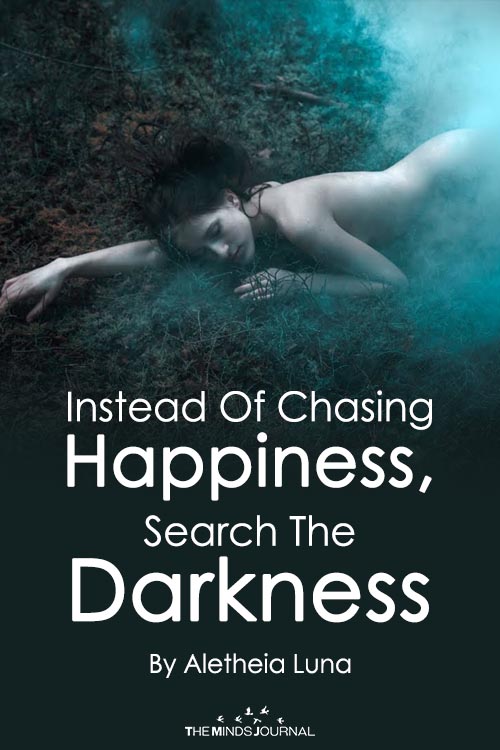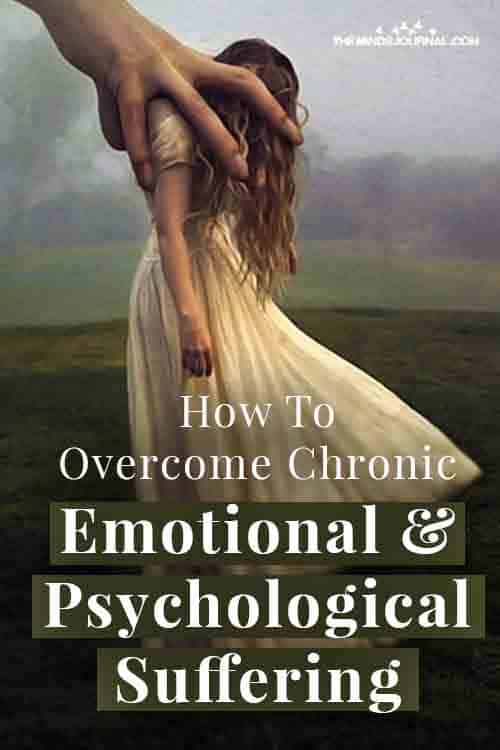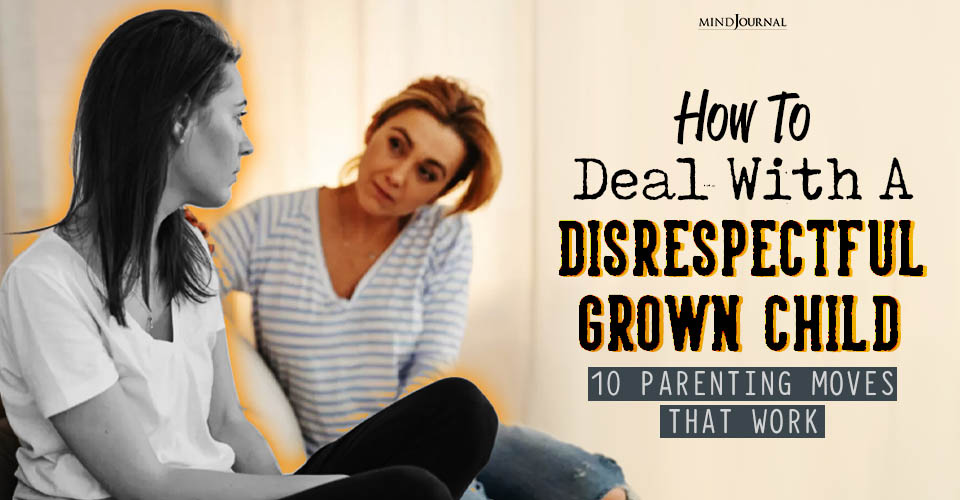What’s the solution to your emotional suffering?
It’s Not Happiness That Holds The Solution To Your Problems; It Is Your Pain.
Your pain, your darkness, your greatest fears, and shadows are the doorways towards your enlightenment.
Within the cobwebs, the dust, the dirt, the dank and rancid confines of your deepest pain, is the key to everything you’ve been searching for.
But most of us don’t understand that the only way around pain is through the pain. Our age-old conditioning whispers in our ear that happiness can be found when we improve this bit of ourselves, change that person, move to this place, get that job, reach this age, obtain that degree … and on and on, ad infinitum.
And there is a certain addictive quality to playing the happiness game. There’s always a new thrill to pursue, a new drama to play out, a new thing to obtain. Quite simply, the pursuit of happiness gives you something to do, so it makes you feel like you’re spending your time meaningfully.
Related: Shadow Self: Embracing Your Inner Darkness
In fact, most of our behavior is driven by chasing happiness. We chase the “ideal” relationship because we feel it will complete us. We chase higher-paying jobs and more money because we believe it will bring us more comfort and security which we believe will give us happiness. In wealthy countries, we buy things we don’t need which we believe will make us happy.
But once we reach or obtain what we’ve been pursuing, what happens? How long do we remain happy? Sometimes we feel happy for a week, a month, or even a single moment. But then the feeling passes, and we’re on the treadmill again, peddling frantically for the next “source” of happiness.
And the sad thing is that we often do this completely unconsciously and impulsively.
Related: Shadow Work: How to Let Your Demons Guide You
Yes, the search of happiness is the most common and pathological addiction we all share these days, and indeed, since the beginning of the human race.
The Cure For Pain Is In The Pain
“The cure for pain, is in the pain”.
— Rumi
The greatest pain that I struggle with isn’t anger or sadness, but fear. I put it down to various social, inherited, neurological, hormonal, and psychological factors. But the fact of the matter is that it’s there. And I’ve tried to escape it for my entire life, always on a daily basis.

For as long as I can remember, there has been fear in my life. Fear of God, fear of my parents, fear of my teachers, fear of other people, and ultimately, fear of myself.
I have tried endless practices to deal with this pain and emotional suffering. I’ve tried medication, herbs, cognitive behavioral therapy, NLP, hypnosis, affirmations, endless self-help books, and so much more. And while these practices helped for a short while to manage the symptoms, they always felt like ways to avoid, minimize or control what I was feeling.
Eventually, I discovered that no matter how much you run from pain or pretend that it isn’t there, it always quivers close by your feet like a shadow.
And in this discovery, I learned something important which I wish all people on the earth could discover:
the cure for pain IS in the pain.
What does this mean?
As Sufi mystic Rumi so eloquently pointed out, pain offers the very doorway to healing. Your pain is a messenger, a sign, and an opportunity to return to Wholeness again.
Pain is essentially a slap on the face that shouts “Hey! Wake up! You’re resisting or clinging to something here.”
So what can we do when we finally wake up?
How To Overcome Chronic Emotional And Psychological Suffering
When I talk about overcoming chronic emotional and psychological suffering, I’m not talking about a quick-fix, once-and-for-all cure to your pain. Sorry. It just doesn’t work that way.
What I can share with you is a tool that doesn’t try to avoid, minimize, or control what you feel, but instead meets it, honors it, and allows it to teach you.
What I’m talking about is something called mindfulness. And from what I’ve experienced, this is the only tool I know of that can help you to meet and overcome pain moment-to-moment.
In terms of awareness, mindfulness is the most powerful soul work tool I have worked with because it helps you to directly access your inner Higher Nature. What I call Higher Nature here is really only a fancy term for the space inside of yourself that is open, infinite, impersonal, and all-loving — and we all possess this unconditionally peaceful space.
Here are some steps to help you overcome emotional suffering:
1. Be Willing To Face Your “Darkscape”
To overcome any chronic suffering you’re experiencing, you really must be willing to search your darkness. You must be willing to face what you have not yet faced or avoided within you for potentially many years.
Related: The Dark Night Of The Soul
Your darkness could be, physically speaking, the size of a fingernail that occasionally pulsates in your chest. Or your darkness maybe like a deep chasm or abyss that seemingly has no end. The “Darkscape” within us always varies from person to person and was created from our inherited and early life wounds, as well as learned patterns and beliefs.
2. Learn To Become Aware Of Triggers And Pain As It Arises
This point can be difficult, and it does take practice. Often, we tend to be stuck in the habit of immediately reacting to whatever pain arises inside of us. We become like robots that automatically switch on “self-protection” mode. We protect ourselves by withdrawing, suppressing, repressing, avoiding, or getting angry and defensive.
Related: How To Turn Your Painful Emotions Into Superpowers
Becoming aware of triggers and pain as it arises requires you to practice meditation. You can also become aware of your internal “Feelingscape” through the regular practice of mindfulness. In fact, mindfulness and meditation go together seamlessly, and I recommend both of them to overcome emotional suffering.
To practice this skill, you will need to commit to it daily. But, let me guarantee, the time you spend will be MORE than worth it.
3. When Pain Aries, Allow It And Hold It In Awareness
It is hardwired into us to avoid that which causes us pain in life. What I’m asking you to do here may seem fundamentally counterproductive. But I challenge you to do it and see if it doesn’t make a difference to your life.
The most important part of holding your pain in awareness is non-judgment. When you start judging your feeling and judging yourself, you create further constriction and tension within your mind and body. Obviously, this doesn’t lead to any form of resolution — only more pain!
Non-judgement naturally comes from the practice of mindfulness and meditation; it is not something you must “do” as much as something you must “allow.” Does that make sense?
Here is an example of holding pain in awareness and going into it might look like:
You’re about to get shopping out of the boot of your car, and it is nighttime. As you walk out underneath the stars, you start feeling fear creep into your body. The sound of a snapping twig makes you jump and thoughts of kidnappers and murderers start firing through your brain. At once, you become aware of these thoughts and the sensations in your body. Instead of fighting them or dramatizing them, you simply allow them to be there. Instead of closing, you open yourself to the fear, and you find that once it is fully seen and held, it dissipates quickly.
Here’s another example:
Your daughter has just said something hurtful to you. Immediately you recognize the stinging sensation in your chest and angry thoughts arise in your mind. You take a deep breath, observe the feelings and thoughts cascade through you, and then drift away again.
4. Realize That Thoughts And Feelings Are Not “You”
Most of us tend to have an unspoken assumption that we are our thoughts and feelings. Einstein called this an “optical illusion” of consciousness. Searching your darkness and allowing your pain to arise is about recognizing that all thoughts and feelings are transient. All of your thoughts and feelings are not you, but instead are spontaneous surges of energy. If you could really control your thoughts and feelings, wouldn’t you always choose to be happy and loving? The fact is that we can’t control the thoughts in our heads. Seeing the essential impersonal nature of thoughts and feelings helps us to become witnesses rather than puppets of our inner landscapes. Understanding that you have no control over thoughts is not about living in denial, but taking responsibility for your happiness by learning how to create more inner space. This inner space will reveal to you your true nature beyond thought and form.
Related: Signs It’s Not Your Body But Your Soul That’s Tired
Search your darkness, and you will discover your light again. Search your darkness, allow it, and hold it in awareness, and you will see that pain isn’t the problem, resisting and reacting to it, is.
“I will face my fear. I will permit it to pass over me and through me. And when it has gone past I will turn the inner eye to see its path. Where the fear has gone there will be nothing. Only I will remain.” — F. Herbert
Written by Aletheia Luna
Originally appeared on Lonerwolf















Leave a Reply
You must be logged in to post a comment.